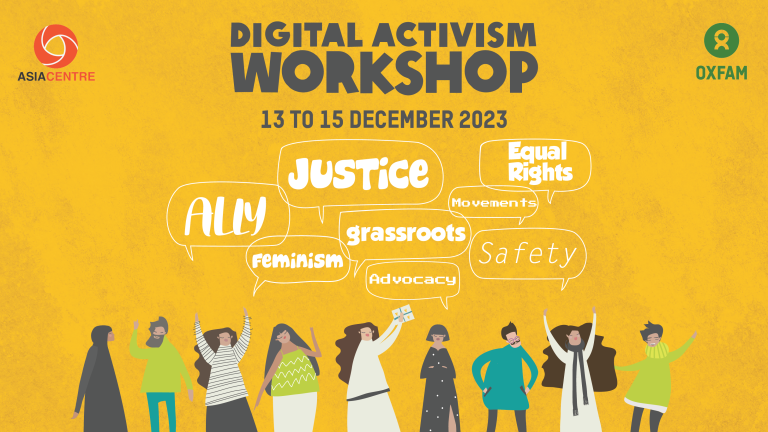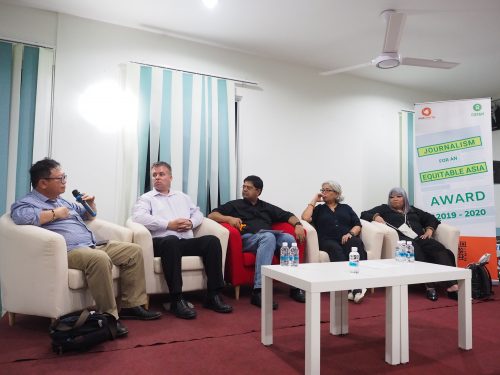Panel Title: Women Human Rights Defenders in Thailand
Organisation: Embassy of Switzerland in Thailand.
Programme: Asia Centre’s 7th International Conference – Freedom of Expression in Asia
Date and Time: 25 August 2022 11.00 AM – 12.30 PM
Venue: Radisson Blu Plaza Bangkok
Welcome Remarks
Conradin Rasi, Chargé d’Affaires a.i, gave his welcome remarks on 25 August 2022. He stated that the Swiss government emphasises the protection of human rights in the country and abroad. Switzerland defines the following as human rights priorities: the abolition of the death penalty, the fight against torture, the protection of minorities and the protection of freedom of expression. He explained freedom of expression is a pillar that buttresses democratic progress in a diverse society such as Switzerland. He noted that freedom of expression is under increasing constraints, and recognises the role human rights defenders play in promoting and protecting freedom of expression. Therefore, the Embassy is pleased to support the Asia Centre conference and support a panel.
Panel: Women Human Rights Defenders in Thailand by the Embassy of Switzerland in Thailand
The speakers of the panel were Angkhana Neelapaijit, a UN Expert and former National Human Right Commissioner Thailand and Chonthicha Jangrew from Democracy Restoration Group. The panel was moderated by Dr. Surachanee Sriyai from Faculty of Political Science, Chulalongkorn University.
Angkhana Neelapaijit
Angkhana began by giving her observation on attacks against women human rights defenders (WHRDs) in Thailand. In the past, WHRDs were threatened with physical assaults. Now more WHRDs are facing judicial harassment by the Thai state and non- state actors. Online bullying by state-sponsored Information Operations (IOs) has also emerged as a new tactic in recent years.
She proceeded to give examples of three types of attacks that she has endured. For physical assault, she narrated that her car was smashed in the early morning of 12 April 2022. She believed that the attacker committed the offence to express his objection against her human rights campaigns. For judicial harassment, she was sued by a company for criminal defamation. The company was accused of using forced labour of Myanmar workers whom Angkhana supported in her role as Thailand National Human Rights Commissioner in 2019. For online bullying, Angkhana said that online posts and pictures containing inhumane and sexist messages against her circulate in cyberspace. She believes that these posts are fabricated by military-supported IOs. This is concurrent with a report from Facebook in May 2021, which states that it had taken down 185 Thai military-affiliated accounts engaging in information-influencing activities.
These forms of attacks have affected her well-being. She lives in constant anxiety and pain, fearing that someone might attack her. They have tainted her reputation, lowered her self-esteem and left psychological trauma with her.
According to Angkhana, while internal mechanisms to punish wrongdoers are in place, WHRDs are confronted with arduous barriers that constrain them from receiving justice. One of which mentioned by Angkhana is access to evidence. Citing her own experience, police authorities often push the burden of finding evidence to which she does not have access. Authorities tend to ignore and procrastinate cases involving WHRDs. In many cases, the investigations yield no results. Fighting cases can exhaust WHRDs’ savings. Such expenses are, among others, court fees and lawyer fees. WHRDs also have to spend their money on psychological treatment.
Chonthicha Jaengraew
Chonthicha explained that since the youth uprising in 2020, the government has employed draconian measures to persecute WHRDs. The roles of WHRDs to the movement, Chonthicha explained, are leading the movement, attracting female, LGBTQs and young people to join the movement and pushing women-related issues onto the movement’s agendas. Given these roles, the government has targeted WHRDs in order to derail the movement.
WHRDs have to endure online bullying and harassment from military-led IOs and the ultra conservatives. These can come in the forms of sexist and sexual harassment comments, life-threatening messages and fake, edited pictures. In the case of Chonthicha, a fabricated chat between two accounts posing as her and a US diplomat was circulated on the internet. The chat suggests that the two have an intimate relationship and are planning to incite violence among young protestors.
WHRDs have found themselves under close surveillance. The government has employed various tools to track movements of WHRDs, ranging from GPS tracking, spyware such as Pegasus and stalking. In one shocking instance, security authorities put the name of a female activist as young as 13 year-old in the national security lists as a monitored person.
Another tactic used by the government to intimidate WHRDs is through legal means. Chonthicha explained that the two repressive legislations mostly used to prosecute WHRDs are Section 112 (Lèse-majesté law) and Section 116 (sedition law) of the Criminal Code. The two legislations carry harsh punishment. And even though the court grants bail to WHRDs, they still have to accept disproportionate bail conditions that constrains them from exercising freedom of expression. Chonthicha is obliged to wear an Electronic Monitoring (EM) on her ankle as part of bail conditions. She said that the EM has labelled and stigmatised her as a criminal. She is paranoid by the feeling that she is being watched all the time.
Question and Answers
Question: Are Thai WHRDs collaborating with other WHRDs in Asia to strengthen their advocacy? (asked by Herynah Andrianarahina)
Answer: Chonthicha answered that Thai WHRDs connect with other WHRDs in the Milk Tea Alliances and learn from each other on how to handle harassment by state authorities. However, the cooperation is not strong.
Question: How does it feel to wear an EM and to be watched? (asked by Aminul Islam)
Answer: Chonthicha feels that her privacy is deprived. She explained that even though the Ministry of Justice assured her that only its officials have access to her EM, the reality is that her location is shared with police authorities. She also feels insecure wearing an EM in public, fearing that people will judge or attack her.
Question: What are Angkhana’s current roles in the UN? (asked by Vinhou Va)
Answer: Angkhana is currently working with the UN Working Group on Enforced or Involuntary Disappearances.
Question: Has Chonthicha ever been harassed in public for wearing an EM? (asked by Vinhou Va)
Answer: Chonthicha has not been physically harassed in public. However, she has received verbal abuse for “breaking the law” from people who recognised her from her EM.
Recommendations
The following recommendations emerged from the panel discussion:
- That the Thai government complies with the United Nations Declaration on Human Rights defenders
- That a law that prevents the use of Strategic Lawsuits against Public Participation (SLAPP) be put in place
- That justice fund is made accessible to all WHRDs and comprehensive of all expenses that may arise, including psychological therapy
- That the Thai government implements recommendations that concerns WHRDs from Universal Periodic Review (UPR), Commitee against Torture, Committee on Economic, Social and Cultural Rights (CESCR), International Covenant on Civil and Political Rights (ICCPR), and Convention on the Elimination of All Forms of Discrimination against Women (CEDAW)
- That a law that punishes gender-based harassment by state officials and gender-sensitive protocols for security forces be in place
- That CSO community recognises the risks specific to WHRDs
Conclusion
The personal experiences from Angkhana and Chonthicha suggest that WHRDs in Thailand are facing gender-specific challenges in the forms of physical assault, online bullying and judicial harassment. To protect them and support their human rights campaigns, the recommendations above must be implemented.



